The Last Comment Section
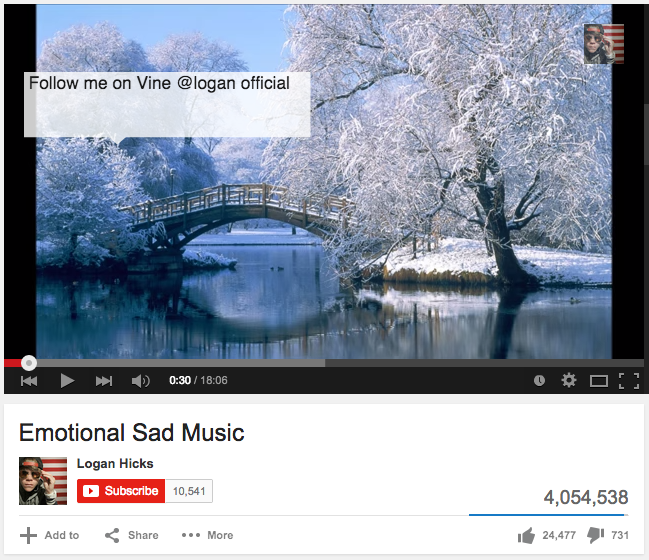
Mark Slutsky’s Sad YouTube project, which preserves moving comments found under song videos, is consistently powerful. It’s one of the rare internet media experiments that transcends gimmick to become art, which is why the continued attention it’s getting is gratifying but not necessarily surprising — you don’t feel like you’re done with it after seeing it once.
It has a subtle effect on how you read the internet, not so much rehabilitating YouTube comments as adding texture to your ideas about what people want from their internets. Unlike performing emotion on social media, mindful of potential feedback and optics and all that, leaving your story in an anonymous YouTube comment section seems to suppose no exterior result at all. It is sharing for sharing’s sake.
Many of the comments Slutsky collects are about memories evoked by a certain song: I was listening to this when; this reminds me of the time. Popular music, with personal and historical associations, is a great vector for memory. It gives the project the quality of an hidden oral history.
But there’s something more utilitarian and need-based about the comment confessional process, too, which brings me to one of the strangest comment sections on the internet: the one under this video.
The video is titled “Emotional Sad Music.” Its description reads as follows:
Emotional Sad Music
Emotional Sad Music
Emotional Sad Music
Emotional Sad Music
Emotional Sad Music
Emotional Sad Music
Emotional Sad Music
Emotional Sad Music
Emotional Sad Music
Emotional Sad Music
Emotional Sad Music
Very sad music you’ll never forget
comment rate subscribe if you thought it was sad
comment what you think
The account that posted it mostly hosts ripped music videos; this, with over four million views, is by far its most popular upload. It has over six thousand comments.
The video is part of an odd area of YouTube that I wouldn’t quite call a subculture — videos that are intended to evoke emotion explicitly. From the listener’s perspective, it offers emotion as a service, to be called upon when you’re too bummed or tired to think of another sad song; from the uploader’s perspective, it usually just seems like easy views — it’s like SEO for moods.
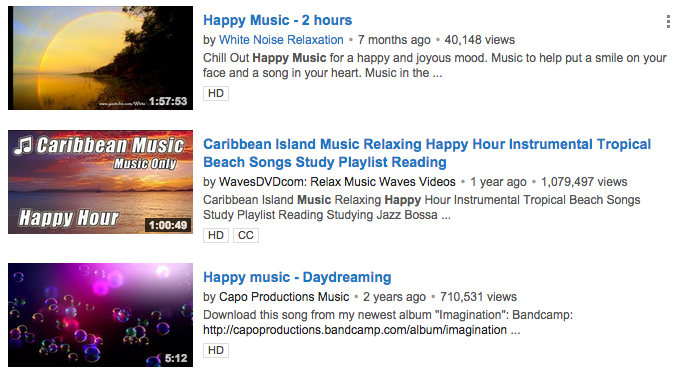
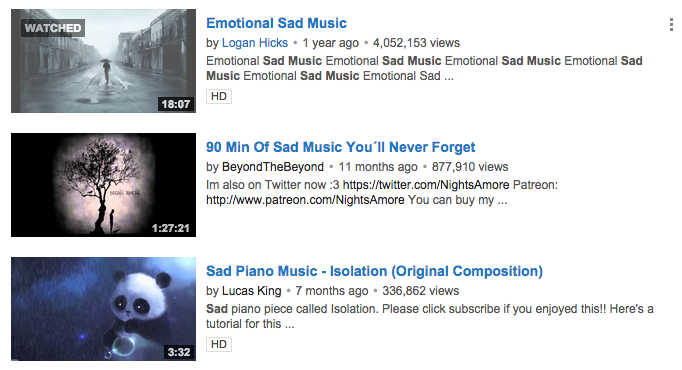
“Emotional Sad Music” is a particularly blunt example: It comprises a slideshow of photos and a playlist of songs either ripped from elsewhere on YouTube or taken from YouTube’s free catalog of stock music — I recognized the first track instantly, because I used it in a tossed-off joke video last year. They’re the songs you find when you search YouTube for sad, depressing and lonely, repackaged with better metadata. The Sad YouTube project suggests that authenticity, channeled through song, draws out deep memories. These videos suggest that, at least in some cases, the memories are just looking for a soundtrack.
My best friend just left me after we have been together for three years. I’m physically and mentally abused by my parents and my siblings hate me. I have friends at school but I barely see them anymore because I have no classes with them. I’m currently failing high school with a extremely low GPI and I have severe symptoms of Bipolar Depression. My mind is always filled with horrendous thoughts and in some cases suicide. I have wanted to talk to someone and get help but I’m afraid of the outcomes. I just want to live alone with my computer and my music that soothes my soul. This story could take up about fifteen more sentences but that’s the basics of my story. I doubt anyone will read this and care. Knowing the internet today, I can tell most people will call this fake. I don’t care though. No one cares about me.
My gramps was sick last year and died of cancer. Same damn year my 15 year old cousin died. It sucks having people die. I know ya guys feel me. Btw this music is too sad!!! Bleh!!!!
my uncle and my friend died too this year , when dead get so close , you feel like , it’s coming to take all the others left around you , i started to live in fear of loosing others , i feel like i gonna cry all the time , i lost trust in this life , one minute you are here , the next you’r not,… leaving every thing , how rediciluous is this !!! , life to me is no longer trustful , this is disgusting , i feel like i gonna die and my heart want to stop , and my job send me to a city where i know no one , i have no friends , i live a shit life , i literally started to hate life
my mom died a couple of months ago I miss her so much
I am realy empty… when listening to this music i dont remeber like realy sad scenes in my life because i never realy cared about anything, i just took life as it came people die and we have funerals, people i know and maybe care about cried but i didn’t realy care “that’s life” is what i said to me. I dont realy thing im a part of this world, there’s another world im escaping to the virtuality “This may be a virtual world, but I feel more alive here than in the real world.” — Kirito. — This sentence is true for me atleast right now maybe i will have other feelings in the future… and maybe care about someone.
okaaaaaaaaaaaaaay honestly, don´t know how to make it through the night
It’s scary how accustomed to pain I am that I almost welcome it in with open arms. The familiarity of it is both gut wrenching and comforting. It’s just gods test to see how many times my heart can break before it becomes irreparable. I’ll just add this to my bag of hurt, I’ve been given a large one so it should fit right in there.
If anyone needs to talk to someone you can message me at anytime as I will always be here 🙂 I know what it feels like to go though bad times
Anyone wants to build a time machine with me? to fix our mistakes that we made, im sure everybody made some…
Why do we torture ourselves with sad music when we’re sad?
A year ago, comments left under “Emotional Sad Music” largely didn’t address one another. Some were earnest and heartbreaking, others were crude and insensitive. But in the last few months, the section has been overtaken by people making jokes. The top comment:
Here is my story…
I once stepped on lego.
The end.
And so on and so on, with hundreds of variations on the same idea: that expressing emotion in a YouTube comment is something only an idiot would do.
It’s not clear if the video was discovered by a large YouTube channel (some of the comments mention their allegiances) or if it just got sucked into some sort of new YouTube garbage vortex, but these are now by far the dominant posts under the video, to the point that very few people bother to write in a confessional tone at all.
In January, Slutsky wrote about changes to the YouTube commenting system, which tied comments to Google-wide accounts. In addition to enforcing identity rules, Google reformatted its comment pages in such a way to encourage threaded interactions — discussions — over drop-and-run comments:
I don’t think Google realizes what it’s sacrificing when it strong-arms its users into declaring their real names. The YouTube comment box is a space of nearly infinite potential, a place for people to express their deepest desires, most tender emotions, and haunting memories. But without a way for commenters to protect their identities, something will be lost.
At the time, Slutsky suggested that the changes had left newer comment sections more civil and sanitary. “The comment section is in the process of being tamed,” he wrote, “and it already seems like a vastly less interesting place.”
Since then, it’s been hard to articulate exactly what’s changed about YouTube comments in general — something, certainly, or a lot of somethings. They’re still a mess, rotten with abuse. But this abuse seems to have been internalized and refined by some sort of new, broader YouTube comment culture — something that had a hard time breaking through when YouTube comments were just primitive walls of text. You see the same jokes over and over in different contexts, and notice the same omnipresent arch teen voice you read in all of the internet’s most influential communities, as if YouTube’s biggest fandoms — the ones clustered around gaming personalities, for example — have begun to take over.
Here’s the best way I can describe it: It can feel, at times, like a bigger and dumber Reddit, or a meaner and more masculine Tumblr. It’s neither an obvious improvement nor a clear decline; one sort of bad has been traded for another. Here’s one thing you can say about it: It’s a lot less surprising.
Glass Streaked
“The trouble with being a window washer is that the better you do your job, the less you have to show for it: It’s painful to do a job where only your mistakes are visible.”
A Poem by Jerome Murphy
A Poem by Jerome Murphy
by Mark Bibbins, Editor
Code Red
I did not shoot a boy for his flaming red hair.
Not a witness was there who would tell you I did.
The agitators are ready to amplify everything
except for the fear I had for my life,
how in one second when his hands
blurred before me, a bright scarlet sear
leapt from his scalp and nearly caught on my own.
How in that moment, I was all dry leaf.
How my eye sockets singed when the spark got near.
I am a man who has always been fair.
This was no little smoldering coal.
Eighteen is a man. A fully grown man.
We’re talking hazardous heavyweight.
We’re talking legitimate fear.
Pardon my questioning your credibility here.
Did you think a sense of dedication meant
I wanted only the badge
to be left of my body?
He had turned away, yes, to flee
but you have to stop a fire before it gets too far.
This is not about anyone’s color of hair.
Others like him will be detained on suspicion
of theft, of affiliation, possession,
specifics which are a matter of precinct confidence
and anyway irrelevant to the very good point
that their behavior is always the same.
Who hasn’t seen them set a city alight.
You ever seen the wind catch a flicker
and blow it too bright and too far?
Storefronts blown in, vehicles in shards,
ammunition in the air. Too hard to contain.
Anyone who’s been in it knows what it’s like,
seen how destructive they are. True, a few will give
off some warmth and likely no little amusement,
but face it — you don’t want too many around.
Theirs is an element to be harnessed for greater
good use, but nothing to play with up close.
Get more than a few of them dancing together
and things are out of control pretty fast.
Ever see August blow a blaze across grass?
Face it, the flame by its nature is dangerous.
Science and society have already made appraisal
of the properties of that particular element.
I’ll only tell you what you already know.
How everywhere they go they bring their own hell.
How the scalp has a distinctive and flammable smell.
At this point admit they must want to stand out.
Is it my concern how they get anywhere?
We’ve given them shot after shot
after shot. That’s what they get. Shot after —
Stop. Stop trying to make it about what it’s not.
I hear accusations of excessive force
from heroes not here to watch this town burn,
the new conflagration flaring out of control
with a jostling rush of chaotic red,
hands in the air, breaking the line, spilling
from sidewalks, this loud tide
of blood. Now you’ve got fellows
from out of town with their bellows,
who come here to coax the blaze bigger,
chucking their own kindling
on the whole fucking thing.
I don’t see color, but I make sure
they see trigger.
Look out at the destruction, its roar.
This is not Lady Liberty’s flare.
Chanting about martyrdom
and what’s at stake for them,
all their flaming heads together look
more like a nightmare of lavas below.
The boy — no, man — was a match for our suspect.
It’s pretty straightforward.
Don’t act like a match
unless you want to get snuffed.
I would do it to you, do you
hear me, I would do it to you.
Boy, we used to douse those flames with hoses,
the little red roses, the little dead angels.
Any infernos on the guest list tonight?
Didn’t think so, and have a nice dinner.
This is about proper surveillance,
this is about maintaining our semblance of order.
This is not about anyone’s color of hair,
not Lady Liberty’s flare, not about color,
all about culture, and anybody who says
otherwise was not there.
You want to believe whatever you hear.
Everything you’ve been hearing
is of nothing but burning, thus far
it has all been smoke and unfair
fiction to which you like
to listen, because who
would kill anyone
for having red hair.
Jerome Murphy received an MFA from the Creative Writing Program at New York University, where he currently serves as Program Administrator. His critical writing has appeared in the LA Review of Books, The Brooklyn Rail, and Lambda Literary.
You will find more poems here. You may contact the editor at poems@theawl.com.
Young Ejecta, "Your Planet"
A spaced-out production in reverse: denouement, climax, rise, introduction.
New York City, November 24, 2014

★★★★ Sometime in the night, the rush of tires on the wet avenue began to penetrate the windows and the deafness of sleep. Rain spotted the panes as the deep blue of dawn brightened to gray. There was just enough variation in the cloud cover to show that it was moving fast. The downpour ended, leaving air too humid and warm for a jacket. The subway turnstiles and platform were wetter and drippier than aboveground had been. The clouds weakened and left, and the sky attained a piercing blue, the autumnal blue so rare this season. Only a wisp of cloud moved through it, here and there. After dark there was a warm lively breeze, a breath from another time and place, springtime in Boston long ago with the magnolias out. Late at night, through the still-open window, there came the grim throbbing of a helicopter.
Lies Told to Me About Thanksgiving by the New York Times
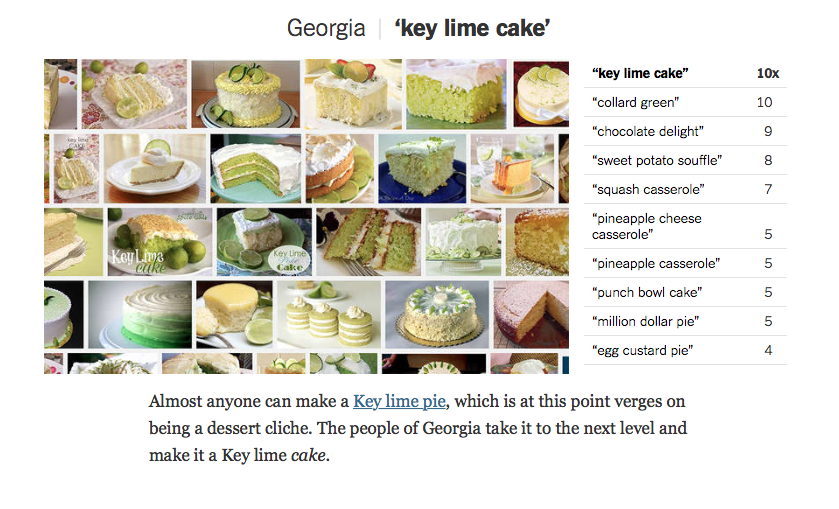
According to Google and the New York Times, the most “distinct” Thanksgiving recipe in Georgia, my home state, a place known for fine delicacies like peanuts, peaches, pecans, Vidalia onions, Moon Pies, Coca-Cola, and RC Cola, is key lime cake, which the Times cheerfully describes as taking key lime pie “to the next level.” Leaving aside the fact that I have never heard of anyone in the state of Georgia producing a key lime cake for any occasion, much less Thanksgiving, this dish is, on its face, a farce.
Key lime pie perhaps suffers from being ill-crafted more than any baked dessert in the world, save the weird, engorged puck of cream cheese and sugar piled on a graham-cracker crust that is commonly referred to as “New York cheesecake.” The average key lime pie is too sweet, too green, too gelatinous. A key lime cake, should anyone deign to make such a thing, is merely an invitation to further degradation: sweeter, greener, more maltextured still. Further, should we consider the uniquely Southern context proposed by this so-called data journalism, a common indignity suffered by food in the South is that when a sweetener is called for in a dish, it cannot be be applied gingerly, but with extreme force, smothering any possible nuance in taste or composition; this is practically endemic in sauces, sweet-savory side dishes, and desserts. This affliction is particularly deadly to the delicate balance necessary for good key lime pie. Put simply, it is reasonable to believe that no one in the South should attempt to make key lime desserts of any sort, much less a cake.
This is to say nothing, of course, of the fact that pie is wholly and completely better than cake.
Lizards Rude
Finally, the Jurassic Park franchise gets its very own Jaws 3-D. Which, in a surprising but apt twist, means Chris Pratt is our era’s Dennis Quaid.
Sorry About Your Thanksgiving
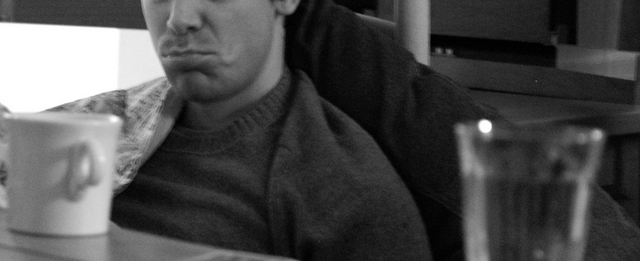
I’m sorry about your Thanksgiving! I’m sorry you’re going to have to have tense conversations about politics and race when you see your family. I’m sorry that you need to make the choice between two paths of mild discomfort: engaging or not. I’m sorry that nobody can stop this, but I’m glad that when you tweet that you are “preparing yourself for battle” with your family, whom you love but apparently do not respect, your sentiments are quickly mirrored, and empathy seems to find you instantly. I’m sorry that your best recourse seems to you to be to ask for public approval for inaction or gratitude for action; to ask, from people who are experiencing something acutely and personally and existentially, for assurances that, despite your ambivalence about conduct and communication and conflict, your self-evident rightness remains self-evident and correct. And I’m sorry that your de facto allyship feels suddenly quite precarious, for some reason. I’m sorry that you will have to “survive” discussions with people to whom you are uniquely influential. I’m sorry about your Thanksgiving!
Photo by Andy Pixel.
Bureaucracy Heartless
Bureaucracy Heartless
Perhaps the most surprising element of the new rules was the inclusion of alcoholic beverages, which had not been part of an earlier proposal. Beverages served in food establishments that are on menus and menu boards will be included, but a mixed drink at a bar will not, F.D.A. officials said.
It seems overly cruel of the FDA’s new calorie-count requirements that if you should find yourself in the kind of place where a drink is listed on the menu with a bold, splashy graphic next to some wings drenched in a sauce whose most prominent flavor note is branding from a major multinational liquor company and wads of processed cheese rolled in “exotic” panko crumbs before being deep-fried, you must be forced to confront the reality that the barely palatable Fireball Whiskey Lemonade (which also contains… vodka?) keeping you level contains as many calories as that soft brick of a potato wedge encased in semi-congealed cheese and sprinkled with too-crunch fake bacon.
The City That Split in Two
by Mae Rice
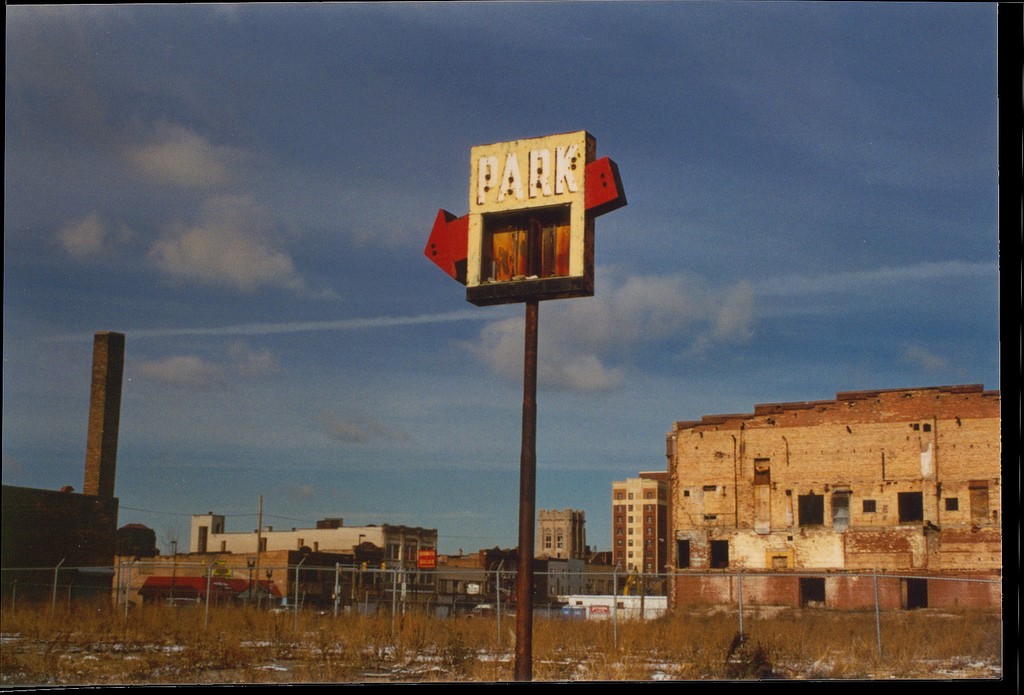
Last month, police in Gary, Indiana found a woman’s body in an abandoned building. When they apprehended her alleged killer, Darren Deon Vann, he confessed to murdering her and six other women and hiding their bodies amongst the some ten thousand empty buildings strewn across the city.
Gary, which was founded as a company town by U.S. Steel in 1906, has slowly amassed these abandoned buildings since the early sixties, when the city steel plant laid off thousands of workers, beginning a long, ongoing process of atrophy. In 1968, when the city elected its first black mayor, Richard Hatcher, a tidal wave of white flight compounded the exodus. A civil rights leader, Hatcher was one of the first black mayors of a major US city, and spent twenty straight years in office.
Today, Hatcher still lives in Gary. He’s eighty-one now, with a sharp, wonkish recall of town history and politics. We talked on the phone about the abandoned buildings’ backstory, and what white flight looked like when he was mayor: less like flight, and more like secession. In 1971, whites from Gary created Merrillville, a new, separate town on Gary’s Southern edge. More than forty years later, it’s still whiter than Gary — forty-six percent to Gary’s eleven — and more prosperous — a forty-six-thousand-dollar median income to Gary’s twenty-six thousand dollars.
Gary’s abandoned buildings have gotten a lot of media attention recently, with the serial killer case. In your view, what’s the story of how they came about?
It’s important to understand what has happened to our city. Once I was elected mayor, and as blacks in Gary gained more political power, whites began moving out of the city. That was not limited to the average white citizens of Gary. What really did great harm was that the major businesses chose to move out.
Sears and Roebuck had one of the biggest stores in this area in downtown Gary. It closed that store and built a new one in Merrillville. We tried to stop them. There were demonstrations, people tearing up their Sears charge cards, and all of that. But they said the people — and they were obviously talking about whites — were moving south. Before these commercial businesses left in the early sixties, we’d also had this problem with our real industry, United States Steel. They’d had this huge plant in Gary that employed more than twenty thousand people. They decided to adopt the technology that the Japanese had been outcompeting them with, and suddenly those twenty thousand jobs went down to seven thousand, which is what they have out there today. Now, the managers boast that a steel ingot can go through the whole plant without touching human hands.
How would you weigh white flight’s role in this? Was it a major factor? More cosmetic?
If we’re going to talk about “white flight,” we should understand what we’re talking about. Generally, when people use that term, they think of it as white citizens who choose not to live in proximity to black citizens. But the part of white flight that has been most damaging to Gary is that we have been colonized, in much the same way many African countries were by the British and the French. The latest estimate that I’ve seen is that our police department is close to sixty percent policemen who live outside of Gary, and most of them are white. They are the ones who are supposed to protect and serve the people of Gary.
The protests in Ferguson must hit close to home.
Yes. The thing with us is, the same is true of the fire department. At least fifty percent of the firemen in Gary live outside the city. A recent study said that of the twenty-four thousand public service jobs, seven thousand of the people who hold them live in Gary. And citywide, Gary does not have a lot of industry. Public service jobs are some of the best jobs that you can get, and yet ours are held by outside people who pay no taxes to Gary. That’s devastating. So you say, why does Gary have abandoned buildings? It’s easy to understand.
Let’s talk about white flight to Merrillville, specifically. To give a sense of scale, I’m curious how many people from Gary, all told, left to go to Merrillville?
One way to measure that is to look at the number of people that were living in the city while I was mayor, and the number of people that are living in the city now. That would be maybe a hundred and seventy-five thousand people while I was mayor, and today, about eighty thousand.
So about ninety-five thousand people?
Well, everyone didn’t go to Merrillville, but the vast majority did. And now, as black people move to Merrillville, whites are moving even further South. Lowell, Jasper country. They just keep running.
How did Merrillville get founded?
So Indiana had this law — the Buffer Zone Law. The law was that you couldn’t incorporate a new city or town within three miles of an existing city or town, to make sure cities had room to expand. One state senator named Adam Benjamin — he was actually elected from Gary — and a state representative, they went and got the state legislature to pass this law that eliminated the buffer zone around Gary.
Just the one around Gary?
Yeah. Indiana’s got a constitution, which says you can’t pass special laws for one city, one town, etc. But they got around that, because instead of saying, “We want to eliminate the buffer zone around Gary,” they said, “We want to eliminate the buffer zone around a city that has a river that runs through it, and that has a steel mill…” and by the time you got down to it, there was only one city in the state that fit that description.
They eliminated that, and formed the town of Merrillville.
As mayor, how did you handle the foundation of Merrillville? I’m curious if you tried to woo the departing whites back at all, and just in general how you responded.
How I responded? I talked about it too much. I was accused of being anti-white. I heard that every day, because I would argue that this is not good for the people of Gary. And since the people of Gary were becoming predominantly African-American, they said “Oh, he’s just for black people.”
To answer your question, I thought it was wrong, and I always opposed the creation of Merrillville. I would go down to the state legislature and meet with the governor and put what I thought were very logical arguments on the table.
What sort of arguments?
I explained to them that, first of all, it was unjust to eliminate Gary’s buffer zone, and leave all the other buffer zones around the state intact. I said that was discriminatory. And since Gary was the city with the highest percentage of African-American citizens, it would appear that you are discriminating against black people. I also tried to make the argument that even if whites’ feelings of racism were so strong that they wanted to move out of Gary, because it has a black mayor — even if that was true — they would have had no place to move, unless they moved a long ways away, and that could be very expensive. But by creating this repository — I call it a repository of racism — called Merrillville, that gave people a place to go.
Remember, the infrastructure of Merrillville was not paid for by the people who moved out there and built houses. The federal government provided the highways and so forth that allowed people to move to Merrillville and still work at US Steel. Which many of them to this day still do. Our tax dollars — they wound up helping whites flee.
Did whites and businesses have any story for why they were leaving, besides that they didn’t like black people?
Well, literally from the day that I took office, there was a systematic effort by the news media to demonize the city of Gary. The largest newspaper in Gary, the Post-Tribune, it was a daily drumbeat, of “there’s so much crime in Gary.” Those of us living here said, “Yeah, we have some crime. Most cities do. But it’s nothing like what the Post-Tribune is putting out there.”
It’s kind of obvious to me that what that did was justify the whole idea of moving to Merrillville. While I was mayor there, this one very popular commentator on the radio station, he came on one morning and said in a very dramatic tone: “A little old lady was viciously attacked and beaten and Mayor Hatcher had no comment.” And then he paused for a moment, and he said, “And this happened in Seattle, Washington.” It was incredible! Anything that would reflect in a negative way on me, on the city itself, the news media at that time played it to the hilt.
That was sort of the way it was. When these things were happening here in Gary, and as blacks began to be elected mayors of other cities around the country — Detroit, Philadelphia — the same patterns repeated. For example, I used to think of Detroit as this great place. They make cars! But now, how do you think of Detroit? A failed city, almost. Well, that was not by accident. This has happened, as minority populations have expanded in these urban areas, you have seen a complete reset of the attitudes.
What was going on in the Gary community while Merrillville was getting founded, and white people were leaving? Were there hurt feelings? Did you hear about friendships ending between people who stayed and people who left?
Well, there’s an area in Gary called Miller that sits right on the shores of Lake Michigan. That’s where our beach is, and that whole area is a nice place to live. Lots of greenery. Many white people who chose not to leave Gary lived in Miller, and they stayed in touch with the Merrillville folks.
And many of the people who have moved to Merrillville more recently — they are black! They come to Gary for church even now. There’s communication.
So relations aren’t terrible.
When Merrillville first came into being, many people took an attitude like I did. If I was invited to something in Merrillville, I wouldn’t go. Shortly after becoming mayor, I was invited to this hotel in Merrillville to give a speech, and when I got there and I was looking around for the room, this waitress — she was absolutely a waitress — was walking by and she asked me, “What are you doing here?”
It should not have, but that really cut me to the bone. She thought I had no right to even be there. So after that, I wouldn’t go. Then some members of the news media got angry at me. They said, “That just shows he’s anti-white.”
What do you think the whole founding of Merrillville says about the democratic process?
Oh, I think it was a complete failure of the democratic process. It was in the Indiana State Constitution that you had to have this buffer zone, but there were enough people on the legislature who thought, “Hey! The buffer zone around the city where I live, we need that. But the buffer zone around that city” — which at that time everyone was looking at as the only black, quote-unquote, city in Indiana — “yeah, it’s okay to take that away.” That clearly was a racially motivated act.
It’s so fascinating to hear all of this discussion about the last election, and why the Democrats lost so badly. None of the commentators mentions racism as being a factor. But in Gary, racism clearly trumped democracy. There is no question about that.
This interview has been edited and condensed for clarity.
Photo by Samuel A. Love
